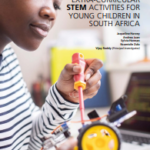MAPPING THE LANDSCAPE OF EXTRA-CURRICULAR STEM ACTIVITIES FOR YOUNG CHILDREN IN SOUTH AFRICA

Science, Technology, Engineering and Mathematics (STEM) are key areas for a country’s development,
and therefore promoting knowledge, interest and involvement in these areas is crucial. This is particularly
important in South Africa as the country transforms into a knowledge-based economy concomitant with
different workforce requirements. The use of extracurricular STEM activities is one way of promoting a
culture of STEM engagement, and therefore this report provided a detailed analysis of activities offered
both nationally and internationally for children from birth to 15 years of age. The report also explored
how access to these activities can be improved for South African children.
The report identified a wide range of activities which covered all ages, with 42 activities available
within South Africa. It is a positive finding that there are activities for all ages, as progression through
the STEM pipeline is just that – a progression. Knowledge and skills build on each other and it should
therefore be ensured that children have adequate foundations on which to build. Children who are
precluded from participation may not see themselves as ‘scientists’ or may struggle later on in their
academic journey, thus preventing them from gaining valuable skills and/or pursuing a STEM career.
Recommendations related to this aspect of inclusion focused on increased communication by the DSI
regarding the key role played by caregivers and on the effect of early-age activities.
Also related to accessibility issues was the fact that there were few activities which could be evaluated
as being broadly accessible, which is concerning. South Africa continues to deal with the social
injustices of the past and it is therefore important that children are provided with equal opportunities
to develop their skills and pursue their interests. Several recommendations thus related to making
these existing activities accessible, including: a centralised hub for organising activities and interaction
between organisations in order to make participation a reality for all children; taking activities to rural
areas; and communication by the DSI promoting available activities. It was also recommended that
regular monitoring and evaluation be included in all STEM initiatives and activities, as this would
ensure that (1) the activities themselves are beneficial for South African children, (2) the activities
provided are appropriate for, and tailored to, the unique South African contexts, and (3) the needs of
South African children are being met, which may require the inclusion of remedial measures.
This report, it is submitted, therefore makes a substantial contribution to the implementation of
strategies and plans by the DSI to promote public knowledge about STEM subjects, scientific literacy,
and engagement with policymakers
